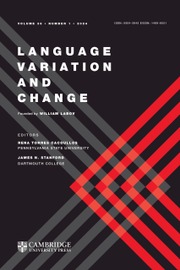Article contents
Directionality in linguistic change and acquisition
Published online by Cambridge University Press: 01 July 1999
Abstract
This article focuses on the directionality observed in the processes of change and acquisition of the prepositions that replaced Latin cases in the speech of Rio de Janeiro and in the Contact Portuguese spoken by Brazilian Indians in the region of Xingu. In Brazilian Portuguese, it is possible to delete the indirect case preposition of some verbs. The system loses and maintains prepositional nexus in a cyclic process motivated by the semantic transparency and the iconicity of the preposition, the adjacency between verb and complement, and the degree of transitivity of the verb. The variable use in Contact Portuguese shows the same effects observed in the Rio de Janeiro variety, in a process that includes a gradual filling up of categorical and variable contexts. We argue that the forces that guide acquisition of the Portuguese prepositional subsystem in the Xingu variety act in the same way as those that constrain variation in urban language.
- Type
- Research Article
- Information
- Copyright
- © 1999 Cambridge University Press
- 2
- Cited by


